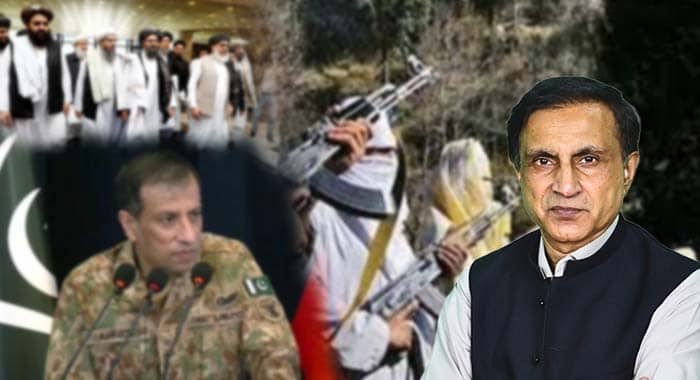Arshad Aziz Malik
The press conference by DG ISPR Lieutenant General Ahmed Sharif Chaudhry has delivered one of the strongest messages yet to Afghanistan and India, warning that Pakistan’s response will be “extremely harsh” if Afghan soil continues to be used for terrorism. The DG ISPR’s detailed briefing underscored a grim reality terror incidents in Khyber Pakhtunkhwa have surged by 70 percent, with Pakistan’s security forces and civilians paying a heavy price for cross-border militancy.
During the two-hour session, the military spokesperson made it abundantly clear that Pakistan has run out of patience with repeated violations of commitments made by the Afghan interim government under the Doha Agreement, which explicitly prohibited the use of Afghan territory against any other country. Despite numerous rounds of talks and goodwill gestures, including visits by Pakistan’s foreign and interior ministers to Kabul, the Taliban government has failed to curb terrorist groups that continue to operate from its soil.
Pakistan’s concerns are not unfounded. More than two dozen terrorist organisations, including the Tehreek-e-Taliban Pakistan (TTP), remain active inside Afghanistan under the umbrella of Al-Qaeda. These groups have targeted Pakistani military convoys, police posts, and civilians alike. The recent martyrdom of several Pakistani officers including two majors, a captain, and over a dozen soldiers underscores the deadly cost of this continued inaction.
The DG ISPR’s remarks reflected growing frustration in Islamabad. He stressed that Pakistan had tried dialogue repeatedly, both with Afghan authorities and with militant groups, but to no avail. The TTP’s so-called peace overtures have consistently turned out to be deceptive. Negotiations, he noted, cannot take place with those who reject the Constitution, the state, and its sovereignty. In past talks, militants demanded that the Pakistan Army withdraw from certain areas and that local governance be handed over to them conditions that amount to conceding territory to terrorists.
This duplicity, combined with a perceived political reluctance within parts of Khyber Pakhtunkhwa to confront militancy, has further emboldened extremist elements. The DG ISPR pointedly observed that while security forces have borne the brunt of terrorist attacks, some political leaders have failed to speak out unequivocally against terrorism. Their preference for talks over operations, despite repeated betrayals by militant groups, raises serious questions about political will.
The situation in Afghanistan itself is equally troubling. The Taliban regime appears either unwilling or incapable of restraining these groups. The truth, however, lies somewhere in between. The Afghan Taliban and the TTP are two sides of the same coin—bound by ideological affinity, years of shared struggle, and mutual dependence. Kabul fears that acting against the TTP could trigger backlash from within its own ranks, which could destabilise its fragile hold on power. As a result, it allows these militants to continue targeting Pakistan to keep them “occupied” outside Afghanistan.
But this strategy is dangerously short-sighted. The unchecked presence of these groups poses not only a threat to Pakistan but to regional stability as a whole. China, Iran, Russia, and the Central Asian republics have all expressed grave concern that Afghanistan is turning into the new global hub of terrorism. A recent four-nation conference involving Pakistan, China, Russia, and Iran warned that the situation, if left unaddressed, could destabilise the entire region.
Meanwhile, India’s role in this equation cannot be ignored. DG ISPR accused New Delhi of financing terrorism in Pakistan through proxies operating out of Afghanistan. The timing of Afghan Foreign Minister Mullah Amir Khan Muttaqi’s recent visit to India only deepens suspicions that India is seeking to exploit Afghanistan’s isolation by funding anti-Pakistan groups. The TTP, BLA, and Al-Majid Brigade all groups that have targeted Pakistan—are reportedly being supported and supplied through covert Indian networks.
It is also a matter of tragic irony that Pakistan, the country that stood by Afghanistan through decades of conflict, now finds itself targeted from the same soil it once helped to liberate. Pakistan advocated international engagement with the Taliban regime, encouraged humanitarian aid, and hoped for a stable neighbour after the U.S. withdrawal in 2021. Instead, what emerged was a regime that turned a blind eye to cross-border terrorism while simultaneously courting India.
Pakistan’s message is now clear: patience has limits. The country cannot remain silent while its soldiers and citizens are attacked from across the border. As DG ISPR stated unequivocally, there is no place for terrorists in Pakistan—nor for those who support them.
If Afghanistan truly seeks peace and recognition on the international stage, it must act decisively against terrorist sanctuaries on its soil. The time for excuses has long passed. Only a firm and verifiable commitment to eliminating terrorism can restore trust between the two neighbours and prevent a regional crisis that could spiral out of control.





